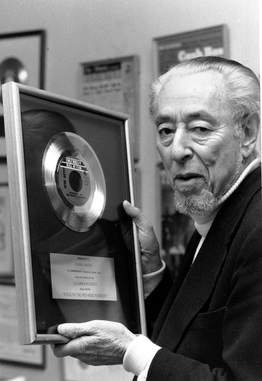Johnny Marks facts for kids
Quick facts for kids
Johnny Marks
|
|
|---|---|
 |
|
| Born |
John David Marks
November 10, 1909 |
| Died | September 3, 1985 (aged 75) |
| Education |
|
| Occupation |
|
| Spouse(s) | Margaret May |
| Children | 3 |
| Relatives |
|
| Military career | |
| Service/ |
United States Army |
| Rank | Captain |
| Unit | 26th Special Service Company |
| Battles/wars | World War II |
| Awards | Bronze Star Medal |
John David Marks (born November 10, 1909 – died September 3, 1985) was an American songwriter. He was especially known for writing many popular Christmas songs. Some of his most famous holiday hits include "Rudolph the Red-Nosed Reindeer" (made famous by Gene Autry), "Rockin' Around the Christmas Tree" (a hit for Brenda Lee), and "A Holly Jolly Christmas" (sung by Burl Ives). He also wrote "Silver and Gold" and "I Heard the Bells on Christmas Day".
Contents
About Johnny Marks
Johnny Marks was born in Mount Vernon, New York. He went to McBurney School, Colgate University, and Columbia University. Later, he even studied in Paris, France.
During World War II, Marks served as a Captain in the United States Army. He was part of the 26th Special Service Company. For his bravery, he received a special award called the Bronze Star Medal.
Marks had three children: Michael, Laura, and David. His wife, Margaret May Marks, had a brother named Robert L. May. Robert May was the person who first wrote the story of Rudolph the Red-Nosed Reindeer. This connection was very important for Johnny Marks's career.
His Amazing Songwriting Career
One of Johnny Marks's biggest achievements was writing the song "Rudolph, the Red-Nosed Reindeer". This song was based on a poem written by his brother-in-law, Robert L. May.
In 1964, a popular television show was made based on the Rudolph story and song. Johnny Marks wrote all the music for this TV special.
Besides writing songs, Marks also started his own music company called St. Nicholas Music in 1949. He was also a director for ASCAP, which is a group that protects the rights of songwriters. In 1981, he was honored by being added to the Songwriters Hall of Fame.
Famous Christmas Songs by Johnny Marks
Here are some of the well-known Christmas songs Johnny Marks wrote:
- Rudolph, the Red-Nosed Reindeer – 1949 (inspired by Robert L. May's poem)
- I Don't Want a Lot for Christmas – 1950
- When Santa Claus Gets Your Letter – 1952
- The Night Before Christmas Song – 1952
- An Old-Fashioned Christmas – 1952
- Everyone's a Child at Christmas – 1956
- I Heard the Bells on Christmas Day – 1956 (he adapted the words from a poem by Henry Wadsworth Longfellow)
- Run Rudolph Run – 1958 (he received credit for this song because he owned the Rudolph character's trademark, even though Chuck Berry wrote the music and words)
- Rockin' Around the Christmas Tree – 1958
- A Merry, Merry Christmas to You – 1959
- The Santa Claus Parade – 1959
- A Caroling We Go – 1966
- Joyous Christmas – 1969
Songs from the 1964 Rudolph, The Red-Nosed Reindeer TV Show
These songs were featured in the classic TV special:
- A Holly Jolly Christmas – 1964 (released as a single in 1965)
- Jingle, Jingle, Jingle – 1964
- The Most Wonderful Day of the Year – 1964
- Silver and Gold – 1964 (released as a single in 1965)
- We Are Santa's Elves – 1964
- There's Always Tomorrow – 1964
- The Island of Misfit Toys – 1964
- We're a Couple of Misfits – 1964
Songs from other TV Productions
- The Tiny Tree (1975): To Love And Be Loved, When Autumn Comes, Tell It to a Turtle
- Rudolph's Shiny New Year (1976): The Moving Finger Writes, Turn Back The Years, It's Raining Sunshine, What A Wonderful World We Live In, Fourth Of July Parade, Have A Little Faith In Me, Have a Happy New Year
Other Songs by Johnny Marks
Marks also wrote many songs that were not about Christmas:
- Happy New Year Darling – 1946
- Address Unknown
- Chicken Today and Feathers Tomorrow
- Don't Cross Your Fingers, Cross Your Heart
- Free
- How Long Is Forever?
- I Guess There's an End to Everything
- Neglected
- She'll Always Remember
- Summer Holiday
- We Speak of You Often
- What've You Got to Lose But Your Heart
- Who Calls?
 | William M. Jackson |
 | Juan E. Gilbert |
 | Neil deGrasse Tyson |

